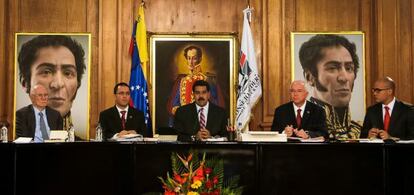Maduro creates a supervising body to control foreign currency exchange
The president launches a crusade to control prices on all goods and prevent black market activity

The answer was as expected. No loosening of controls or fiscal reforms. President Nicolás Maduro insists on "building a new economic order to guide the country's transition to socialism." In practice that means increased government control over the economy and the creation of new structures that will abate the people's avidity for the subsidies the government offers on the dollar since 2003.
On Wednesday, Maduro unveiled the Centro Nacional de Comercio Exterior, or National Bank for Foreign Commerce, which will coordinate all other government bodies and mechanisms that exchange and circulate dollars. The President also announced the creation of a National Budget for Currency. Though he gave no more detail about its management, his words hinted at the trajectory ahead: buyers will have to submit a request for the amount they want and the government will decide how much and how it delivers. "We are going to fulfill all our needs and we are going to have a surplus of currency," he said.
These measures are meant to fix prices instead of letting them fluctuate based on demand and supply. The increase in uncontrolled goods alarms the president. Their prices are based on the value of the dollar on the black market, nine times that of the controlled currency. The dollar is officially worth 6.3 bolívars. According to Maduro importers usually ask for 30 percent more foreign currency than they need. It's a very common practice in Venezuela where responses to requests roll out slowly and the habit of using whatever is left over after paying for imports on the black market. No business can use up their stock in so little time.
With the National Budget for Currency the government hopes to avoid the foreign currency's flow into the black market by carefully studying each importer's petition. Analysts in the media have said that the decision could actually block currency circulation -another trend that feeds the black market.
"It's like a collective bargaining dispute," said José Guerra, professor at Universidad Central de Venezuela. "Employees ask for 90 percent increase and the boss agrees to only 10 percent. One side overestimates, the other underestimates." Each company or person will submit a petition for what he wants at the national budget office and the government will decide how much to give out. "This is going to lead to a shortage," Guerra added.
The professor recalled that during the administration of the social democrat Jaime Lusinchi (1984-1989), who also controlled foreign currency exchange, there was also a national budget for monies. In the last year of that government's tenure, the economy was in a coma. The next year, the newly elected President Carlos Andrés Pérez started an adjustment program that followed the classic prescriptions from the International Monetary Fund. Three weeks later, on February 27, 1989, there were disturbances and riots in downtown Caracas leaving dozens dead or injured. The Chavistas have wanted to commemorate those clashes.
The new government bodies will be under the supervision of the Vice President of Economy, Rafael Ramírez, who is also the Minister of Oil. During the press conference he said there would be a review of businesses that exchange money. Ramírez comes from the most radical wing of the government and he has managed to convince Maduro not to swerve and straight up the direction of the Venezuelan economy. That kind of vision attributes all domestic problems to a conspiracy by a chimera called "parasitic bourgeoisie" whose ultimate goal is toppling the Bolivarian Revolution.
With inflation reaching up to 38.7 percent this year and the scarcity index hitting around 20 percent on average, the government hopes these measures will cover up the economic instability these statistics point out. The economists who stand against Maduro are not so optimistic. December 8, the Day of Loyalty to Chávez, will show whether the people are happy or not as they vote in the municipal elections.
Translation: Dyane Jean François
Tu suscripción se está usando en otro dispositivo
¿Quieres añadir otro usuario a tu suscripción?
Si continúas leyendo en este dispositivo, no se podrá leer en el otro.
FlechaTu suscripción se está usando en otro dispositivo y solo puedes acceder a EL PAÍS desde un dispositivo a la vez.
Si quieres compartir tu cuenta, cambia tu suscripción a la modalidad Premium, así podrás añadir otro usuario. Cada uno accederá con su propia cuenta de email, lo que os permitirá personalizar vuestra experiencia en EL PAÍS.
¿Tienes una suscripción de empresa? Accede aquí para contratar más cuentas.
En el caso de no saber quién está usando tu cuenta, te recomendamos cambiar tu contraseña aquí.
Si decides continuar compartiendo tu cuenta, este mensaje se mostrará en tu dispositivo y en el de la otra persona que está usando tu cuenta de forma indefinida, afectando a tu experiencia de lectura. Puedes consultar aquí los términos y condiciones de la suscripción digital.








































